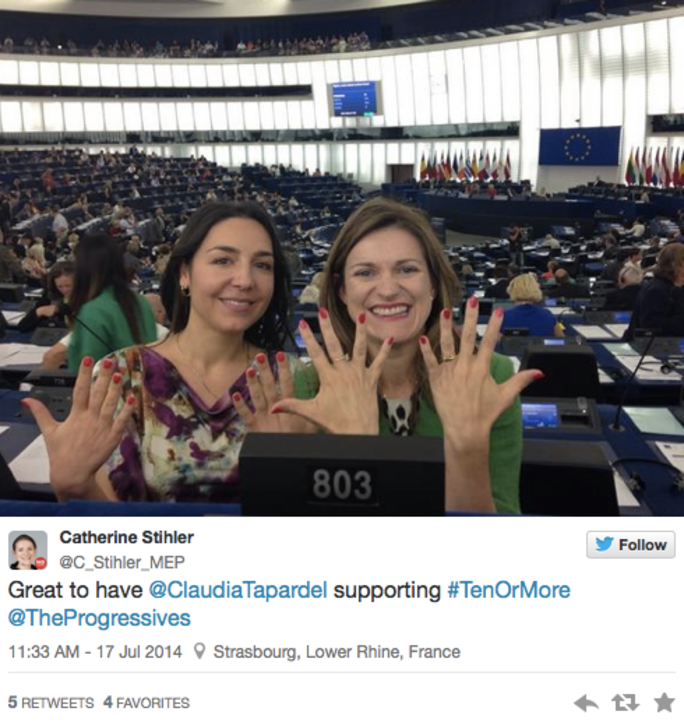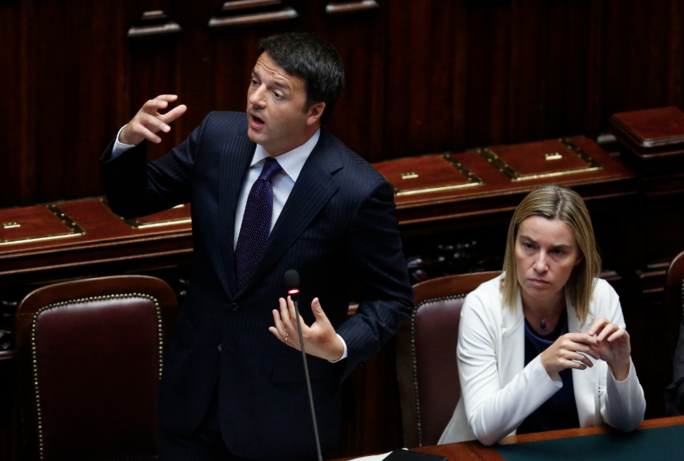It became abundantly clear this week that the make-up of the future team of commissioners to serve under the next European Commission (EC) President, Jean-Claude Juncker, whose term begins in November, will be very far indeed from meeting gender parity.
For the moment, out of the 23 commissioners who have already been approved by European Union (EU) member states – the final number of commissioners will total 28 – just four are women. With some member states yet to put forward their own candidates (each EU country puts forward candidates who must be approved by the other states), the tally of women sitting on the commission could, at the very most, be nine.
If that is the case, it would exactly match the outgoing commission under the second term of President José Manuel Barroso. If the number of women appointed to the next commission remains at four, one has to travel back two decades to the 1995-1999 commission under Jacques Santer to find the last time the parity was so weak.
Outgoing digital affairs commissioner Neelie Kroes last week tweeted: “Former Prime Ministers make up 0.00000001% of EU population, yet more of them are nominated as European Commissioners than the 51% women!”
In theory, candidates are nominated by member states in consultation with the commission president. The latter will then assign portfolios according to his choice. The nine outgoing women European commissioners sent a jointly-signed letter to Juncker on July 10th in which they appealed to him to nominate “at least” ten women commissioners in his new team.


“Dear Jean Claude,” wrote the women commissioners.“We wish to support your call for member states to support more women as new commissioners.Over the past ten years, around one-third of European commissioners have been women, largely because José Manuel Barroso put his foot down and insisted on this.”
“It is also increasingly clear via research and anecdote that large organisations perform better with a diverse leadership, this corresponds with our experience in the Barroso I and Barroso II commissions,” they continued. “The European Union is committed to making continual progress towards gender equality. Such progress demands an increase, not a decrease, in the number of female commissioners, particularly as we have grown to be a family of 28 member states. We therefore urge member states to nominate at least 10 female commissioners, with your support.”
The situation is not an easy one for Juncker. A number of members of the European Parliament (MEPs), to which Juncker’s choice of commissioners will be submitted for approval this autumn, have already warned that they will reject a team which has less than the nine women members of the outgoing commission. However, Juncker cannot interfere in the choice of candidates put forward by individual EU member countries – he can only decide upon who gets what.
Among the major EU states who can in general expect to gain the most powerful portfolios for their candidate, four have put forward men for the job: France, Britain, Germany and Spain. An exception here is Italy, where Prime Minister Matteo Renzi has nominated his current foreign affairs minister, Federica Mogherini, for a commission post (and one he ambitiously hopes will be that of foreign affairs and security, succeeding Catherine Ashton).

Enlargement : Illustration 3

“Four women out of 28 for the moment is totally inacceptable,” Spanish socialist MEP Iratxe Garcia, who is also president of the European Parliament’s women’s rights committee, told Mediapart. “And every team that has less women than in the outgoing commission is inacceptable too. Each capital should have put forward two names, a man and a woman, as was considered at one period.”
In a statement published this week, the European Parliament Green/ Free Alliance political group warned that “incoming Commission president Juncker must send EU governments back to the drawing board”.
“MEPs have made very clear that they will not accept a gender imbalanced Commission, so Jean-Claude Juncker needs to urgently address this before presenting his candidates to the European Parliament,” concluded Rebecca Harms and Philippe Lamberts, co-presidents of the group.
Apart from Italy’s candidate Federica Mogherini, the remaining women approved by EU member states for a commission post are the Czech Vera Jourova and two re-nominated, outgoing commissioners, the Swede Cecilia Malmström and the Bulgarian Gueorguievia Kristalina.
It is reported possible that Belgium may propose as its candidate the conservative MEP Marianne Thyssen, but nothing is yet certain amid continuing negotiations to form a new government.
Last month, the European affairs specialist website Europolitics published a list of “Seventy women worthy of being named commissioners”, choosing candidates from across the EU. While the Netherlands is hesitating over its choice of candidate for commissioner, Dutch daily NRC stepped in with its own list of 40 women it believed qualified for the job. But the rumour circulating in Brussels this week is that the likely Dutch candidate will be finance minister Jeroen Djisselbloem.
The issue is set to drag on, but it is probable that the final composition will be decided by August 30th when an extraordinary European Council meeting is called to decide the successors to the council’s current president, Herman Van Rompuy, and to the foreign affairs high commission post held by Catherine Ashton.
Meanwhile, Spain has put forward Miguel Arias Cañete, head of the ruling conservative party’s European election campaign, and who until this year had served three years as agriculture minister, as its candidate for a commission post. Cañete caused a controversy in Spain with a comment he made after a TV debate, just days before the European elections, with his socialist rival Elena Valenciano. “A debate between a man and a woman is always complicated,” he said. “If you abuse your intellectual superiority you look like a macho and appear to threaten a defenceless woman.” He apologized for the comment some five days later, but the incident caused a national uproar.
French President François Hollande chose to nominate his former finance minister Pierre Moscovici above two women also in competition for the candidature: former European affairs and justice minister Élisabeth Guigou and socialist MEP Pervenche Berès. Speaking after a European council meeting in mid-July about the then-widely expected but still unannounced choice of Moscivici, Hollande commented: “President Juncker wants women but france has its freedom of choice.”
Questioned about this at the time, members of Hollande’s entourage were a little more forthcoming. “The representation of women among the commission is important,” said one, speaking on condition of anonymity. “But that does not mean that it’s a necessity that a woman occupies the post of representative of France […] France is one of the countries who have in the past sent most women to the European Commission.” Of the 15 French commissioners nominated in succession since the EC was established in 1958, just two are women - Christiane Scrivener and Édith Cresson.
-------------------------
- The French version of this article is available here.
English version by Graham Tearse


